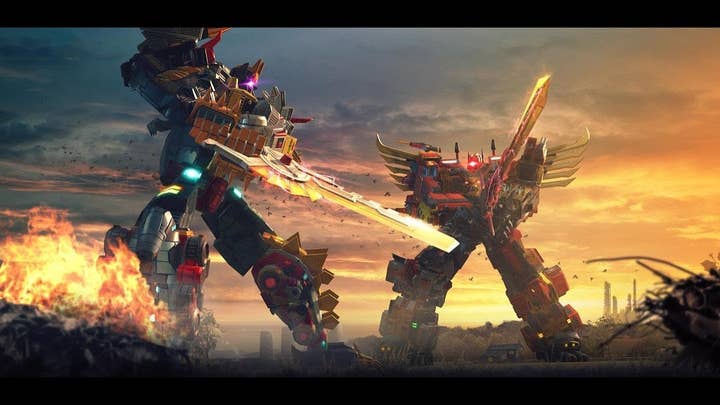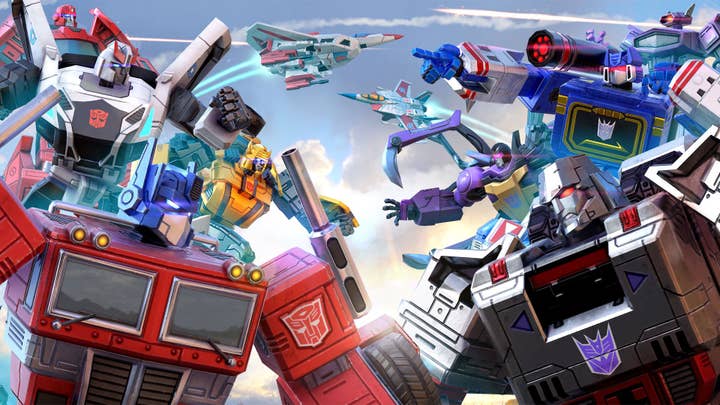Big spending whales aren't the problem with free-to-play games | Opinion
A player spending $150k on a mobile game isn't a problem -- but we should still be conscious of players that struggle with compulsion
You'd think, given the inevitable backlash reaction, that we would have long since moved past the point where mobile game operators try to brag about how much money their biggest "whales" have spent. I guess that memo never quite reached Yodo1 boss Henry Fong, who blithely announced a few days ago that a player of Transformers: Earth Wars (which is developed by UK-based Space Ape Games but operated in China by Yodo1) has spent US$150,000 on the title.
These headline figures are probably meant to drive home the popularity of the game or the dedication of its fans, but inevitably, the conversation sparked has been quite a different one -- leading straight back to the increasing criticism and scrutiny of game monetisation practices which has gone far beyond consumer disquiet and is being actively taken up by governments around the world.
The reason it's terribly unwise to boast about these kinds of "high roller" numbers is, in part, that reactions to cases like this are always pretty extreme. There remains a fairly strong sense among a not insignificant chunk of game consumers that there's something intrinsically wrong with people playing a mobile game who end up paying out more than the cost of a full-price PC or console game. It's a position born to quite an extent from prejudice and the inability to see that their own perception of value is personal, not universal; "If you're paying that much money you could just have bought a real game" assumes a definition of "real games" that not everyone shares by any means. There are plenty of people who have the time and inclination to play mobile games but no desire whatsoever to engage with PC or console titles, and there's nothing wrong with that choice.
"People spending a few thousand dollars on a mobile game are assumed to have been fooled into wasting their money"
Besides, the notion that the price of a full-cost "real" game should serve as some kind of hard limit on mobile game spending is inherently ridiculous. Not just because of the apples and oranges nature of the comparison (you're paying for innately different things, reflecting basically different conceptions of value), but also because that price is far from being the limit to what people spend on PC or console titles. Again, there's a kind of prejudice at work here which it's long past time for us to move beyond.
People spending a few thousand dollars on a mobile game are assumed to have been hoodwinked or fooled into wasting their money, yet flick through any consumer-focused game website and you'll find tons of examples of hardcore fans being celebrated for the lengths they'll go to in order to attend events like Blizzcon or Quakecon, create hugely expensive and elaborate costumes or models of their favourite characters, customise vehicles or parts of their homes, and generally spend pretty significant chunks of their income on expressing and pursuing their interest in a specific game.
So here's the thing; I don't think there's actually anything intrinsically wrong with someone dropping $150,000 on a Transformers mobile game. There are caveats, though, and they're important. I'd want to feel pretty confident that the person involved can afford $150,000, for a start. I know that in many ways that's not the responsibility of either the developer or the publisher. You could, after all, choose to remortgage your house and spend every damned penny of a loan you can ill-afford on buying any number of daft things; if you spent it all on chocolate, I don't think anyone would blame Cadburys for your foolishness.
The metaphor doesn't quite fit, though, because Cadburys doesn't have quite the same relationship with its consumers in terms of how its products are marketed, sold and consumed that a mobile game operator does. It would also be intellectually dishonest to ignore the fact that mobile game monetisation is inherently a process of creating wholly artificial scarcity of items whose necessity, creation and consumption the developer alone can control. That's a lot of power over how much compulsion a player feels and it does, I think, introduce a slightly different moral argument to the question of whether the game operator has a responsibility to ensure they're not doing financial harm to their players.
"I'd really want to be convinced that there's a justification for a player dropping $150,000 on in-game items"
The other caveat, which is perhaps more immediate and relevant, is that I'd really want to be convinced that there's a justification for a player -- even one who can afford that much cash on a whim -- dropping $150,000 on in-game items. I mean this in terms of the game's own monetisation design; the very fact that it's possible to spend so much in many mobile games raises some questions about how the game itself is designed and where its financial chokepoints lie.
For clarity, I don't think Space Ape did anything actually wrong in this instance. Transformers: Earth Wars is a solid, well-made game and its monetisation isn't really anything you wouldn't see in dozens of other (often far less thoughtfully implemented) games. It does, however, have what is essentially a "gacha" mechanism for acquiring Transformers robots, meaning that there's a random element which can vastly alter the value you receive for the money you spend on premium currency. Premium currency can also be used to buy speed-ups and resources, though this feature -- trading money for time -- is arguably a far less controversial aspect of free-to-play overall, since at least part of the success of mobile titles has lain in their recognition that older players often have far more disposable cash than they do disposable time.

The reason gacha mechanisms have come under so much scrutiny lies in their borderline proximity to gambling -- "pay money, maybe get the thing you want" -- but also in the fact that, along with energy mechanisms, they constitute a way in which the ceiling on spending in a mobile game is lifted effectively to infinity. Even in a game with a limited roster of characters and items, a gacha mechanism generally means you could pay literally all the money in the world and still have a non-zero chance of not collecting them all (or getting the one you especially want). Some developers effectively impose a soft cap on expenditure by tweaking the gacha percentages over time to let people complete their collections despite a run of bad luck, but there's no requirement to do this and it's far from being a universal practice.
"People spending tens of thousands in these games indicates an underlying problem in the tissue between business model and game design"
This is a problem, not because there's an intrinsic issue with people spending a lot of money on a game they love, but because it feels like there is a pretty basic issue with that expenditure coming due to a monetisation system that harshly punishes bad luck and lack of impulse control. For every player who's an idle multi-millionaire that doesn't really care how many times he buys premium currency as long as he eventually gets the characters he wants, how many are there who can't really afford to pay more this month, but end up spending to a personally damaging extent on premium currency for a time-limited event or similar?
We can talk up personal responsibility until the cows come home, but the reality is that not everyone is in full control of their own spending habits -- and these mechanisms are especially difficult to resist for players who have any kind of disorder that features an element of obsession or fixation. I don't doubt that the Chinese Transformers ultra-fan who dropped $150,000 on the game is doing just fine, but it does make me wonder how many others were gripped by the same compulsion and were not fine, despite spending sums that were merely in the hundreds or low thousands.
Ultimately there's a strong philosophical argument that if someone who won't miss $150,000 wants to spend it on a mobile game, that's no better or worse than spending it on a yacht or a painting or any other expensive and unnecessary item. It may seem crazy to you or I to spend that much money on a mobile game; equally, I'm sure any one of us spends money on things that others might think are daft or wasteful, albeit perhaps not on that scale. The practical questions of monetisation design, compulsion and player psychology, however, make things more complex.
The existence of high rollers isn't so much the problem, as the fact that people spending tens of thousands in these games likely indicates an underlying problem in the inter-connective tissue between business model and game design. It raises uncomfortable questions about how the same compulsion mechanisms that drove the high rollers to such heights might have played out on far less financially secure individuals in the audience.
Let people spend money on things they enjoy by all means -- and for god's sake, let's all stop criticising people just for spending money they can comfortably afford on things they enjoy doing -- but equally let's not pretend that developers' ability to create compulsion isn't very advanced, or that every consumer comes equally well-equipped to make a rational and careful choice when faced with those mechanisms.

